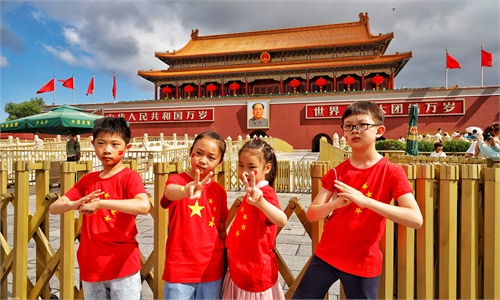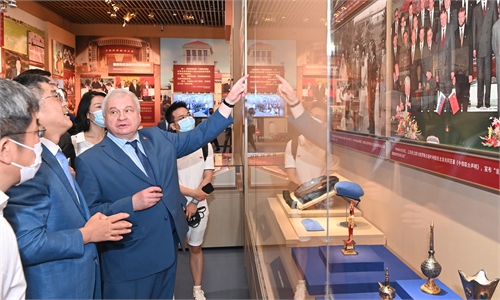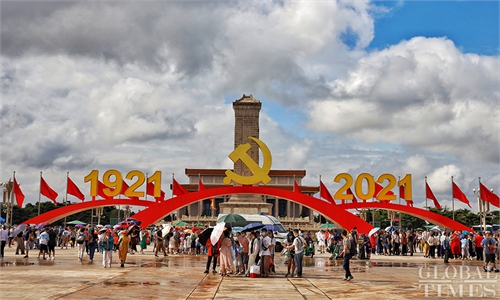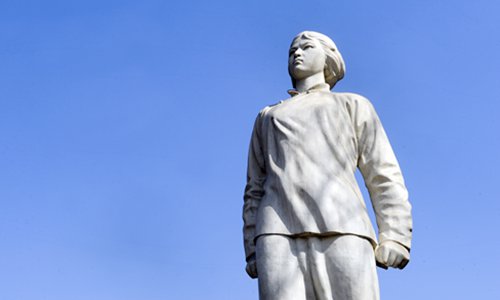
Statue of Liu Hulan in North China's Shanxi Province. Photo: VCG
As the Communist Party of China (CPC) celebrates its centennial, female CPC members were venerably remembered for their irreplaceable role in pooling wisdom and making sacrifices to fuel the country's development and sovereignty on the national path toward socialist modernization.
Global Times reporters visited the birthplaces, workplaces, and tombs of three honored CPC female members who sacrificed their young lives for their beliefs in the Party and China's rejuvenation.
From a teen girl, Liu Hulan, who scarified herself prior to the establishment of the People's Republic of China, and 29-year-old Jiang Zhujun who died in 1949, to a young female village Party secretary who died in 2019, the sublime spirit of female revolutionary communists has been inherited and runs in the veins of each generation.
Blood-stained soil marks strong faith
At Liu Hulan's memorial hall located in Wenshui, North China's Shanxi Province, where she was born, many youngsters and tour groups pay tributes to her legacy and learn about her life story as a brave young martyr who made a heroic sacrifice in front of the enemy during the Chinese People's War of Liberation (1946-49).
"I would not be a Communist member if I am afraid of death," said the 15-year-old Liu Hulan while calmly lying under the guillotine after seeing six comrades beheaded. She was captured by the Kuomintang army in 1947.
Chairman Mao Zedong declared her as "a great life and a glorious death" and personally penned the calligraphy of such epithet.
Pointing at the only family photo on the wall of the memorial hall, 67-year-old Liu Jilie, the youngest child from the Liu Hulan's family, told the Global Times that her sister had fostered a belief to join the CPC and fight in the revolution at a very young age.
When her peers were occupied with the ideas of marriage and family, Liu Hulan focused on how to help the Party in order to fight for the people. When she witnessed CPC members helping locals in troubled times, it strengthened her resolve, Liu Jilie said.
"What's more than the courage of a young girl is the power of faith. After she was killed, many of the communists who came later took blood-stained chunks of frozen soil soaked with her blood into their arms, hoping to remember her and carry on the faith," Yue Jianming, director of the CPC history research office of Wenshui county, told the Global Times.
Liu Jilie said he had also taken along a sachet stuffed with soil blocks that were dipped with blood of Liu Hulan for years, before he donated it to the memorial hall.
"My mother sewed a sachet and gave it to me when I joined the army. She wanted me to inherit my sister's revolutionary spirit."
Following his sister's path, Liu Jilie joined the CPC where he served in the army at 19. He believed that being a CPC member was the right thing to do.
Liu Hulan has been exposed to the dream of CPC since she was seven, and her pursuit reflected the Party's appeal to the youth who were desired to save China from a corrupt Kuomintang, Yue suggested.
The cruel environment of struggle shaped Liu Hulan's bold personality, bravery, strength, and an indomitable will. Because of her many outstanding tasks, the Party organization trusted her even more and arranged for her to lead a training class for women cadres for 40 days before she served as the secretary of the Women's Rescue Association of West Village of Yunzhou.
The Women's Rescue Association at the time mainly organized women in the village to make military logistics for the Eighth Route Army soldiers. Liu Hulan's participation shows that she realized early on that the Chinese revolution could not be accomplished without the power of women, Yue explained.
The martyr was ratified as an official member of the CPC on August 1, 1947, six months after her sacrifice.
The courageous spirit of the martyr has even drawn foreign visitors to the memorial hall. Those especially from Vietnam, Japan, and Albania were most frequently seen in 1960s and 70s, and were all moved whenever they heard the heroic story of Liu Hulan, according to Liu Jilie.
Death for future's prosperity
In front of the statue of Jiang Zhujun in her birthplace, Zigong city, Southwest China's Sichuan Province, hundreds of people holding Chinese national flags and flowers gathered together to pay tribute to the deceased heroine. And some Party branches held a solemn ceremony for new Party members in the CPC.
Jiang Zhujun was a Chinese communist revolutionary martyr born in Sichuan and joined the CPC in 1939. In 1948, her husband was killed when he was leading a group of guerrillas. She then took over her husband's role. After being betrayed, Jiang Zhujun was arrested and later imprisoned at Zhazidong Prison in Southwest China's Chongqing, where the Kuomintang used in the late 1940s to jail communists. She was tortured in the prison but she did not reveal anything to the Kuomintang. On November 14, 1949, the 29-year-old Jiang Zhujun and 29 other CPC members were shot to death and their bodies were destroyed.
"My aunt had seen a lot of social inequality in her life and she believed that only the CPC could help people to live a good life, so she was not afraid of sacrificing her life and would have liked to do everything for the CPC," Jiang Zigang, a nephew of Jiang, told the Global Times.
In the memory of many Chinese people, female CPC members represented by Jiang all exhibited tremendous bravery and maintained the revolutionary integrity of true communists when facing death and retribution.
Because of numerous comrades like Jiang Zhujun who chose death over surrender, the CPC rapidly grew and led the entire nation to victory in the War of Resistance against Japanese Aggression (1931-45) and in the War of Liberation (1946-49), Ma Qike, Curator of Chongqing Hongyan Revolutionary History Museum, told the Global Times.
"What my aunt hoped was to have a good society and the people would live a good life. She would be very happy if she saw the founding of People's Republic of China and how its people are now living good lives," said Jiang Zigang.
"Jiang Zhujun is a hero to Chinese people, especially to women! As an old man who experienced life in poverty, I don't believe we would have ever been a part of such a prosperous China without the CPC," 81-year-old Liu Shixiang, coming from a thousand miles away to commemorate Jiang shared with the Global Times, with tears rolling down his eyes.
A hero that shines in poverty alleviation
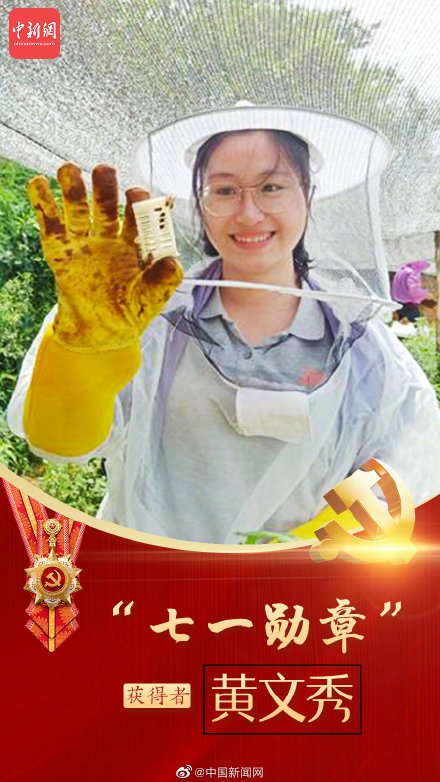
Huang Wenxiu photo:ecnsphotos
On June 6, 2019, 30-year-old Huang Wenxiu was returning to the village during a torrential downpour, when a flood crushed her car into the mountains, through which she had had a dream of constructing a concrete road for local farmers and their fruits.
In 2018, Huang Wenxiu, a freshly graduate from Beijing Normal University, became the new CPC chief in Baini village, one of the poorest places deep in South China's Guangxi Zhuang Autonomous Region, responsible for poverty relief work.
In order to deliver local perishable fruits, sugar tangerines typically to the region, to other parts of China, Huang Wenxiu established an e-commerce shop and applied for the funding for a road for delivery. In 2019, the road was finally put into operation, after her death.
The villagers called the road "a path to prosperity," and it helped them sell more than 20,000 kilograms of tangerines that year. A total of 88 households out of 103 were lifted out of poverty.
Initially, Huang, a young woman, barely 30 with master degree from one of the best universities in China, was not exactly the kind of secretary that the villagers were expecting.
"No one really thought she would be here for long. It is a job that is too tough for a well-educated young woman like her," a villager named Huang Jinqing said, "and everyone thought she was from a rich family and came here only to gain some experiences that will make her resume look better."
But Huang Wenxiu soon proved them wrong with her hard work and affable nature. She loves bustling among the households wearing her straw hats, talking about their families and hers, because it is a sheer joy to help out her own people with things big and small.
Villagers would routinely welcome her to their homes, and if she hadn't had dinner, she would happily finish whatever they had left over from their humble dinner table, sometimes a plain bun, sometimes a bowl of rice porridge with pickles.
It was only after her death that the villagers found that Huang Wenxiu's own family was almost as humble as their own. Her mother was too weak to carry out demanding tasks in the field, and the main breadwinner was her father, who had unfortunately been diagnosed with cancer.
Why come back to the poor village? People would ask her. It is incredibly hard, and not worth the while for the incredible investment in the good education that she had received.
"We are a humble family, which was taken care of by the CPC, and her education was not possible without financial aid from the government," Huang Zhongjie, father of Huang Wenxiu recalled. "She always had a higher calling to give back, and she always thought that helping others was more meaningful than having a luxurious wealthy life."
